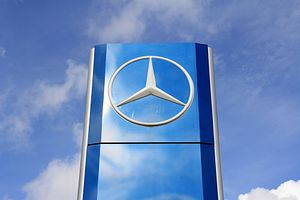China’s Jiangsu Province has imposed a 350 million RMB ($56 million) fine on Mercedes-Benz for price fixing and monopolistic behavior. The provincial government’s Price Bureau found that Mercedes-Benz fixed floor prices of E-class and S-class cars through various verbal transactions with dealers. Mercedes-Benz is the latest target in a string of antitrust cases involving foreign firms, while domestic firms have faced less fire.
Mercedes-Benz has catered to China’s growing elite and overseas customers. The expansion of Mercedes-Benz in China reflects an overall trend in which China may soon become the world’s largest luxury auto market, even in the face of the administration’s corruption crackdown. Despite its popularity with Chinese consumers, the luxury automobile maker has been under scrutiny, along with other foreign automakers, for anti-competitive behavior, since last year. Daimler, Mercedes’ parent company, vowed to ensure full compliance with the anti-monopoly law.
Other foreign firms have been investigated for anti-competitive behavior, including Microsoft, Qualcomm, and GlaxoSmithKline. More than 1,000 automakers, suppliers, and dealers were caught up in the investigation. Chrysler and Audi were among the automakers under scrutiny. Fines levied on foreign firms have prompted some analysts to assert that non-Chinese firms are being unfairly targeted.
So how is the anti-monopoly law enforced? Three government agencies are responsible for enforcing anti-monopoly law: the Ministry of Commerce (MOFCOM), the National Development Reform Commission (NDRC) and the State Administration for Industry and Commerce (SAIC). The NDRC and SAIC, both responsible for violations, have cracked down on monopolistic behavior among American, European, and Japanese firms in recent months. While in some cases, only the foreign partner company in joint ventures have been subject to fines, China asserts that it does not discriminate between foreign and domestic firms in its enforcement of anti-trust law.
The interpretation of China’s anti-trust law will inevitably be aligned with state interests, as state-owned enterprises (SOE) hold monopoly positions in some industries. It is notable that the Anti-Monopoly Law states that in industries vital to national economic and security interests, monopolies can be protected, supervised and controlled. While the interpretation of the clause could mean that SOE monopolies can be reined in, this has not happened. SOE-dominated sectors contribute the lion’s share of SOE profits. This is particularly so in the tobacco, oil extraction, and electricity supply sectors.
In fact, China’s socialist-market economy is unique, and monopolization of particular sectors is a major characteristic of the nation’s industrial organization. As Duan and Saich (2013) find, Chinese laws actually effectively help to maintain China’s state monopoly in certain sectors: a monopoly in energy resources is protected by the Mineral Resources Law through the use of controlled franchises and restricted competition; a monopoly in the telecommunications industry is aided by the permit system, which lays out restrictions on foreign participation in the sector. Government pricing also sets prices on goods and services such as tobacco and railway transportation. The dominance of SOEs in certain sectors is reinforced by asset monopolies, in which the state holds company shares, and other manifestations of state control.
We can conclude, then, that the NDRC and SAIC have not found against SOE monopolies because state monopolization, under most manifestations, is legal, even though foreign monopolization is not. This is simply a characteristic of the Chinese economy that must be accepted, and Mercedes-Benz-cum-Daimler already has. State monopoly may decline as reforms progress, although how and to what degree non-state actors will be allowed is unclear. Until then, we can expect more fines levied on large foreign firms, and perhaps on more well-heeled automakers.

































